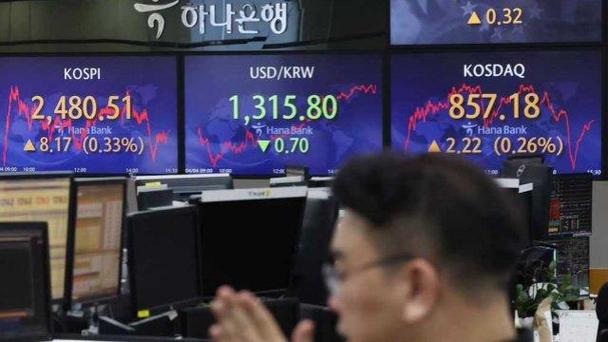
After the implementation of emergency martial law in South Korea on December 3, 2024, its financial markets were like a strong storm, and were significantly impacted from multiple dimensions.
First, the stock market is volatile and confidence has suffered. Under the shadow of the martial law incident, the Korean stock market is in a state of extreme instability. In just three days after the incident, the total market value of the stock market was like a collapsed building, which evaporated as much as 58 trillion won. Among them, the benchmark kospi index and the second-tier kosdaq index fell to 52-week lows on the first trading day after the impeachment motion failed. Stock prices in many industries have plunged, with Samsung Electronics, for example, showing a heart-wrenching decline in its U.S.-traded share price. Even in December 10, the South Korean stock market ushered in a brief rebound, but it is difficult to cover up the great trauma brought by the previous plunge, investors' confidence is like a broken mirror, it is difficult to recover in the short term, and the future direction of the market is full of confusion and worry.
Second, the foreign exchange market is in turmoil and exchange rate volatility has increased. The Korean won s performance in the foreign exchange market was also dismal. The won was like a runaway train against the dollar in New York trading, falling as much as 2.9 per cent to 1,444.65, making it one of the worst performers in the Asian currency race. Looking back at the whole of 2024, the won has depreciated by more than 9%, which is like a heavy boulder on the shoulders of the South Korean economy. Sharp fluctuations in exchange rates, like unpredictable storms at sea, make it difficult for many companies to navigate the choppy waters of foreign exchange risk. For a highly export-dependent economy such as South Korea, the profits of export companies are like fragile boats, at any time facing the danger of being ruthlessly swallowed by exchange rate fluctuations, which seriously weakens its competitive advantage in the international market.
In addition, the withdrawal of foreign capital accelerated, and the outflow of capital surged. The withdrawal of foreign capital from the Korean financial market is becoming more and more obvious, like the ebb of the sea, taking away the vitality and vitality of the market. According to the authoritative data released by the Financial Supervisory Service (FSS) on December 10, foreign investors in the Korean stock market were terrified during November, net selling amounted to 4.154 trillion won, and this net selling behavior has continued for a full four months. As South Korea is once again in a period of turmoil over the impeachment of its president, the uncertainty in the market is growing like a thick cloud. In this harsh environment, the net selling behavior of foreign investors is expected to continue like a surging tide, which undoubtedly further aggravated the outflow of funds in the Korean financial market, making the capital chain of the market increasingly tight, and the stability of the unprecedented severe challenge.
Finally, financial credibility is at risk, and financing costs may rise. South Korea's credibility in the financial market is also facing a severe test due to the martial law incident. Renowned international credit rating agencies Fitch and Moody's have issued stern warnings that if the turmoil caused by the martial law incident continues to spread, South Korea's national credit rating will be dragged into a dangerous mire and face a huge risk of downgrade. The U.S. investment bank Bank of America also expressed concern that the repeal of the impeachment has cast a cloud of uncertainty over a long period of time, and at a time when the fundamentals of the Korean economy are relatively weak, the downward pressure on the won is like a volcano about to erupt, which is more and more heavy. Once the credit rating is unfortunately lowered, it will be worse for South Korean enterprises and the government, and its financing costs will rise rapidly like a rocket, which will further constrain the hands and feet of economic development and make the South Korean economy struggle even harder.
Amid the gloom, however, there are dissenting voices. Cho Dong-chul, president of the Korea Development Institute, soberly points out that South Korea's economic fundamentals are now more solid than they were during the dramatic Asian financial crisis of 1997-1998. South Korea is a solid bulwark of ample foreign exchange reserves, has run a current account surplus every year for the past three decades, and has net external assets of about half of gross domestic product, or about $1,000bn. Based on such strong strength, he believes that Korea will not fall into the desperate situation of foreign currency liquidity crisis. In any case, the direction of South Korea's financial markets after the martial law incident remains uncertain and will require continued close attention from global investors and economic observers.

On December 29th, Mar-a-Lago in Florida, USA, witnessed a highly anticipated diplomatic meeting - a dialogue between US President Trump and Israeli Prime Minister Netanyahu.
On December 29th, Mar-a-Lago in Florida, USA, witnessed a h…
SoftBank Group announced on Monday that it has agreed to ac…
Recently, the US State Department issued a visa ban, adding…
On January 20, 2025, just 13 days after taking office, Trum…
On December 19, 2025, the U.S. Department of Energy, along …
The relationship between the Trump administration and the U…